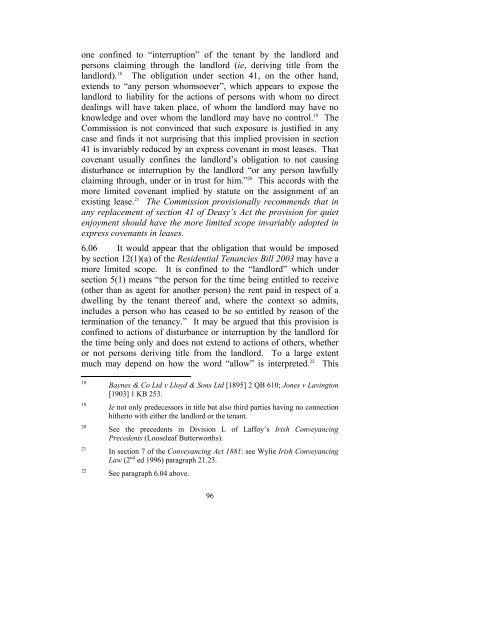Consultation Paper on the General Law of the Landlord and Tenant
Consultation Paper on the General Law of the Landlord and Tenant
Consultation Paper on the General Law of the Landlord and Tenant
Create successful ePaper yourself
Turn your PDF publications into a flip-book with our unique Google optimized e-Paper software.
<strong>on</strong>e c<strong>on</strong>fined to “interrupti<strong>on</strong>” <strong>of</strong> <strong>the</strong> tenant by <strong>the</strong> l<strong>and</strong>lord <strong>and</strong>pers<strong>on</strong>s claiming through <strong>the</strong> l<strong>and</strong>lord (ie, deriving title from <strong>the</strong>l<strong>and</strong>lord). 18 The obligati<strong>on</strong> under secti<strong>on</strong> 41, <strong>on</strong> <strong>the</strong> o<strong>the</strong>r h<strong>and</strong>,extends to “any pers<strong>on</strong> whomsoever”, which appears to expose <strong>the</strong>l<strong>and</strong>lord to liability for <strong>the</strong> acti<strong>on</strong>s <strong>of</strong> pers<strong>on</strong>s with whom no directdealings will have taken place, <strong>of</strong> whom <strong>the</strong> l<strong>and</strong>lord may have noknowledge <strong>and</strong> over whom <strong>the</strong> l<strong>and</strong>lord may have no c<strong>on</strong>trol. 19 TheCommissi<strong>on</strong> is not c<strong>on</strong>vinced that such exposure is justified in anycase <strong>and</strong> finds it not surprising that this implied provisi<strong>on</strong> in secti<strong>on</strong>41 is invariably reduced by an express covenant in most leases. Thatcovenant usually c<strong>on</strong>fines <strong>the</strong> l<strong>and</strong>lord’s obligati<strong>on</strong> to not causingdisturbance or interrupti<strong>on</strong> by <strong>the</strong> l<strong>and</strong>lord “or any pers<strong>on</strong> lawfullyclaiming through, under or in trust for him.” 20 This accords with <strong>the</strong>more limited covenant implied by statute <strong>on</strong> <strong>the</strong> assignment <strong>of</strong> anexisting lease. 21 The Commissi<strong>on</strong> provisi<strong>on</strong>ally recommends that inany replacement <strong>of</strong> secti<strong>on</strong> 41 <strong>of</strong> Deasy’s Act <strong>the</strong> provisi<strong>on</strong> for quietenjoyment should have <strong>the</strong> more limited scope invariably adopted inexpress covenants in leases.6.06 It would appear that <strong>the</strong> obligati<strong>on</strong> that would be imposedby secti<strong>on</strong> 12(1)(a) <strong>of</strong> <strong>the</strong> Residential Tenancies Bill 2003 may have amore limited scope. It is c<strong>on</strong>fined to <strong>the</strong> “l<strong>and</strong>lord” which undersecti<strong>on</strong> 5(1) means “<strong>the</strong> pers<strong>on</strong> for <strong>the</strong> time being entitled to receive(o<strong>the</strong>r than as agent for ano<strong>the</strong>r pers<strong>on</strong>) <strong>the</strong> rent paid in respect <strong>of</strong> adwelling by <strong>the</strong> tenant <strong>the</strong>re<strong>of</strong> <strong>and</strong>, where <strong>the</strong> c<strong>on</strong>text so admits,includes a pers<strong>on</strong> who has ceased to be so entitled by reas<strong>on</strong> <strong>of</strong> <strong>the</strong>terminati<strong>on</strong> <strong>of</strong> <strong>the</strong> tenancy.” It may be argued that this provisi<strong>on</strong> isc<strong>on</strong>fined to acti<strong>on</strong>s <strong>of</strong> disturbance or interrupti<strong>on</strong> by <strong>the</strong> l<strong>and</strong>lord for<strong>the</strong> time being <strong>on</strong>ly <strong>and</strong> does not extend to acti<strong>on</strong>s <strong>of</strong> o<strong>the</strong>rs, whe<strong>the</strong>ror not pers<strong>on</strong>s deriving title from <strong>the</strong> l<strong>and</strong>lord. To a large extentmuch may depend <strong>on</strong> how <strong>the</strong> word “allow” is interpreted. 22 This1819202122Baynes & Co Ltd v Lloyd & S<strong>on</strong>s Ltd [1895] 2 QB 610; J<strong>on</strong>es v Lavingt<strong>on</strong>[1903] 1 KB 253.Ie not <strong>on</strong>ly predecessors in title but also third parties having no c<strong>on</strong>necti<strong>on</strong>hi<strong>the</strong>rto with ei<strong>the</strong>r <strong>the</strong> l<strong>and</strong>lord or <strong>the</strong> tenant.See <strong>the</strong> precedents in Divisi<strong>on</strong> L <strong>of</strong> Laffoy’s Irish C<strong>on</strong>veyancingPrecedents (Looseleaf Butterworths).In secti<strong>on</strong> 7 <strong>of</strong> <strong>the</strong> C<strong>on</strong>veyancing Act 1881: see Wylie Irish C<strong>on</strong>veyancing<strong>Law</strong> (2 nd ed 1996) paragraph 21.23.See paragraph 6.04 above.96
















